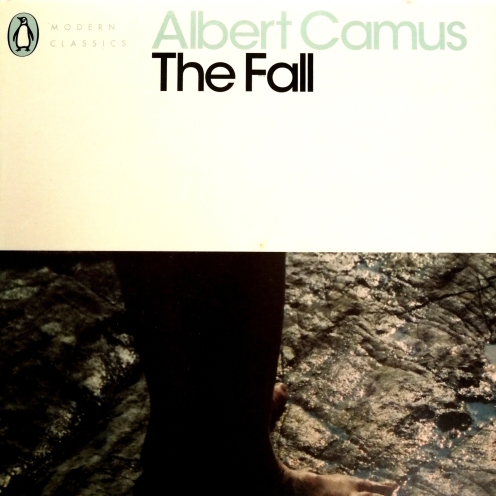At the back end of last year The Fall (or La Chute in the original french) fell into my lap (you see what I did there right?) and I couldn’t resist finishing off 2018 with a little existentialism. In my poking around online I have come to discover that this was the last completed novel Camus wrote, but it is far from his lightest. I have consumed a small nibble of absurdist writing and all of it Camus, I had mixed feelings on The Outsider and adored the bittersweet heartache in The Plague, but there is something about Camus that just keeps me coming back for more. There is something intoxicating about the style of writing, that I just want to absorb or embody, or wear as clothes.
Much like The Outsider, the narrative in The Fall contains seemingly meaningless events that cause something like a fall from grace. But this novel could be argued as a larger allegory for the fall of man. This fall is something inevitable and necessary and unforgiving. This is not a larger narrative that you piece together slowly. It’s framed as one of those unfortunate moments where you bump into the one drunk in the bar that will talk your ear off and not leave you alone. That drunk is Jean-Baptiste Clamance – and his confession is yours to judge.

The Fall – Albert Camus
Camus uses a seemingly innocent encounter and a way of writing I’m not sure I’ve ever seen before. It is written as if you yourself are stood at the bar with Jean-Baptiste Clamance, in silence, letting him unload his confession. With minor pauses and phrases as if questions from the reader are being repeated and answered. I was in quite a rapture with this style of writing as Camus builds the characters you and this Clamance are easily. You are both men, in your forties and from Paris and you find yourself in Amsterdam at the same bar night after night listening to this seemingly helpful stranger.
Clamance states that he started out as a good man by his own measure, he was once like the listener to the tale, a magistrate where he lived a fine and satisfying life in Paris and believed himself a model citizen. But the illusion is broken when walking by the Seine one night he witnesses a woman flinging herself from the river bank to her death in the water bellow. It appears her fall triggers his own. And continuing on in his Solipsistic monologue he states how from that point on he was awakened to the reality of both his own, and the whole of humanity’s guilt.
Like some sort of vessel for the human race’s guilt, Clamence retreats from his life choosing instead to spend his days recounting his story in the hope others will be awakened as he has been. All to alleviate the burden he himself carries. He is candid about the opinion of himself saying that he is both condemned and condemning, a sort of judge-penitent and although he says he has taken to his misanthropic life with ease there is no hope to his words.
As the story unfolds, it is clear that although Clamance claims to want clemency for himself and others he is far more obsessed with himself and his self given job of judgement. Preoccupied with his own mortality early on in the novel he only seeks to do good acts when watched by groups of people. He only seeks to warn others of the danger of ‘the fall’, while both attempting to awaken listeners to the failings and delusions of humanity.
Although Clamance, as a respected lawyer should be seen as the face of morality, he seems to belong easily to the gap between reality and illusion. And I must admit a great deal of this novel seems to be about unpicking the ambiguity of Camus ideas which at best can be tricky and bleak.
Clamance is not a character I root for, but neither do I root for him to fall further and horribly and as deep into the abyss as possible. I want to try and pity him, and I watch his journey with particular morbid interest. There is a lot of selfish humanity in him, as a character life seems to fall into his lap easily, and although he struggles with genuine friendship and committing to women. He wants to possess women and their affections wholeheartedly but not being possessed in the slightest himself. And I struggle to connect with him as there isn’t anything redeemable to him in my mind.
I wholeheartedly haven’t riddled out this novel and I can’t decide if Clamance is trying to entice the reader and the listener into abandoning a prospering life. Or if his intention is simply to derail the reader so you can judge him and separate yourself from that behaviour and watch him slide into his ravings. I’m stumped on that one. I just don’t know what his actual intentions are because I don’t trust him as a narrator. And as a character I find Clamance both fascinating and repugnant, intriguing but utterly repellant. Which incidentally is exactly how I feel about 90% of the people I have bumped shoulders with and started a conversation with at a bar.
This is an interesting read, but difficult, and there is a fog of ambiguous ideas that I personally would probably need another read and a good discussion to unpick. Camus writes brilliantly as ever but I have a hunch this one in particular would be better read with his other work to support it. A good book to end a year on, or close a chapter on.








